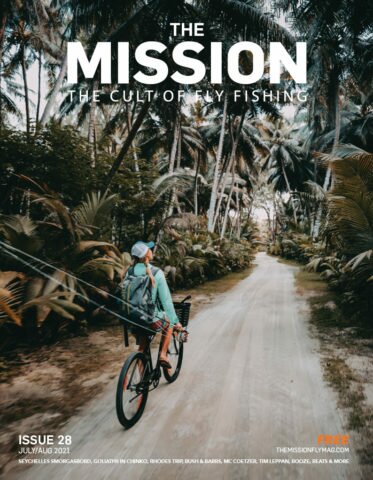
New edition of The Mission is out now!

New edition of The Mission is out now!
Comments Off on The Mission – Issue 28
Filed under emagazine
Barry says, “PDQ (pretty damn quick) caddis will not only float all day long, but it also takes under 4 minutes to tie! This very simple technique, uses a single natural CDC hackle and a small bunch of bleached deer hair and has proven fatal for many a fish…”
Materials list:
Hook: Mustad R30 # 14
Tying thread: Sheer 14/0 Brown
Body/under wing: One natural CDC hackle
Wing: Bleached deer hair
Comments Off on PDQ Caddis with Barry Ord Clarke
Filed under Dry Fly
From Holsinger’s Fly Shop:
“It’s Cicada time here at the shop. 2021 is the year for Brood X here on the east coast and our shop sits right on the north west edge of the hatch. The next hatch of cicadas is in the year 2025 here in Pennsylvania and is brood 14 which will cover the central part f the state to include the great trout streams like the Little J and Penns Creek. So Tie some of these patterns up and then file them away for the next couple of years because they will be back. ”
“In this video I first show you on the stream how I like to fish this pattern. Then, I head back and sit down and show you how I like to tie my variation of the pattern Greg Hoover came up with years ago. This has been a proven pattern and has been catching fish for me this year.”
Materials List:
Firehole 839 Size 10
Nano Silk 120/0 Black
5mm Black Craft Foam
Variegated Chenille Med. Black/Orange
Barred Round Rubber Med Orange /Black
Krystal Flash UV Orange
Krystal Flash Pearl
Comments Off on Tying And Fishing The Cicada, Holsinger’s Fly Shop
Filed under cicada
In this video, Brian Flechsig of Mad River Outfitters and Josh McQueen of Ohio Fly Fishing Guides fly fish the 17 year Brood X. Needless to say, it is insanity.
Filed under cicada

Check out the new issue of In The Loop magazine!
Comments Off on In The Loop – Issue #29
Filed under emagazine
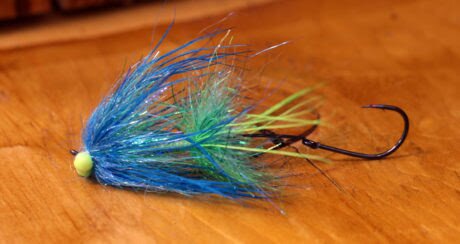
This one is brought to us by Deneki Outdoors Fishing Lodges.
“Ah…King Salmon season. We love King Salmon season. The might King or Chinook Salmon is one of the most sought-after game fish across the world. When it comes to King flies, materials, colors, profile, and movement are the most attributes in a productive King Salmon fly. Does size matter? Sure, depending on conditions. Just because King Salmon are big fish doesn’t necessarily mean they want big flies.”
“Intruder-style flies have been a go-to for King Salmon for a hot minute. Intruders have a good profile and movement, and you can use a variety of materials. A composite loop method allows you to try a variety of different materials synthetic with furs and feathers. The composite loop allows you to get really creative with material combinations for that super groovy and vibrant fly.”
“In this fly, we use a go-to color combination of chartreuse and blue for King Salmon. But don’t hesitate to try a variety of colors, and mix materials; blacks, purples, reds, pinks, and even oranges. Experiment and have fun with it then show us what you got! Even better, send us a picture of the fish you hooked with it.”
Tied By: Brian Davenport. Brian Davenport is a customer service representative & manager at Mossy’s Fly Shop. He is a die-hard swing fisherman, father, and fly tier.
Photos: Mike Brown of Mossy’s Fly Shop.
Materials list:
Shank – Aqua Fly 43mm Return Eye
Dumbbell Eyes – Aqua Fly 3/16 Fl Chartreuse
Stinger Thread – 30lb Fireline or Intruder Wire. Wire supports a heavier hook better than the Fireline.
Hook – OPST 1/0 Swing Hook (Tiemco 600SP sz 1 or 2, is another great option for Kings)
Rear Shoulder – King Fisher Blue Ice Dub-Sky Fusion Dub Blended & Chartreuse Ice Dub, Nuked Green Bean Aqua Veil, Chartreuse Bait Fish Emulator, Pale Olive Pearl Polar Flash
Twin Tails – Chartreuse Rhea or Ostrich
Body – Veevus Mini Flat Braid Chartreuse
Front Shoulder – Chartreuse Ice Dub, King Fisher Blue-Sky Fusion Dub blended, Aqua Rainbow Polar Flash, Popsicle Aqua Veil, Steelie Blue Ice Dub, Clearwater Blue Angel Hair and King Fisher Blue Ostrich
Thread: Veevus 140 White or Chartreuse

Step 1: Secure in your dumbbell eyes right behind the shank eye, then secure your stinger material down the shank. Make your stinger loop long enough to change out the hook you are using.
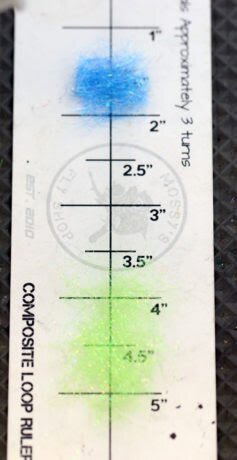
Step 2 Base Layer: Take a pinch of the King Fisher Blue Ice dub and Sky Fusion Dub, blend them to together. You will want a ½” amount for the top of your first loop. Lay out a 1” of Chartreuse Ice Dub.
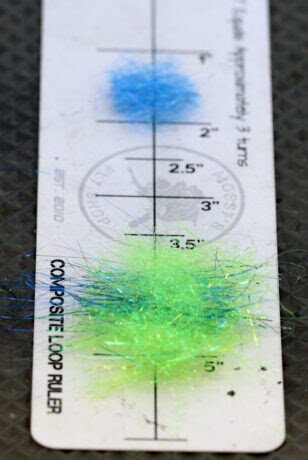
Step 3 Support Layer: Take a few strands of Pale Olive Polar Flash over the top of the chartreuse base layer, you want the flash to stick past each side of the base layer equally. Now take a few strands of Chartreuse Bait Fish Emulator and repeat the same as the polar flash. Using your Nuked Green Bean Aqua Veil, cut a few strands from the core and repeat the previous. Lay a thin layer of Chartreuse Ice Dub over the top.
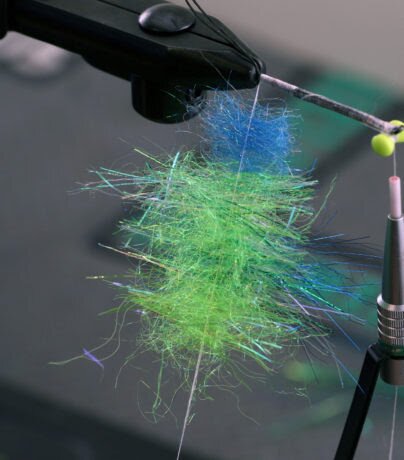
Step 4: Create a dubbing loop and place your material in the loop. You will be able to pick the material up very easily, as the ice dub binds the materials together like Velcro. Using your bodkin, spread your material out and situate as needed.
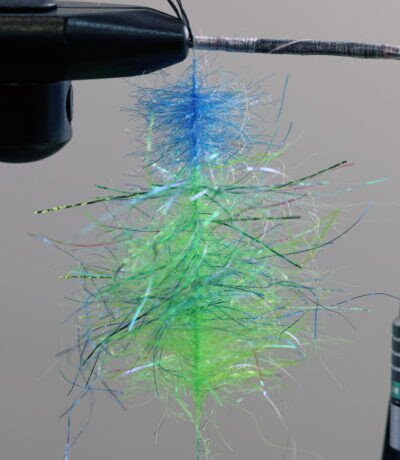
Step 5: Spin your loop up tight. Using your bodkin and a stiff bristle brush, pick and comb your loop. You want to create a thin, rope like, core. This may take a little bit to accomplish, but you want the thin core so that you don’t get to much bulk when you wrap.
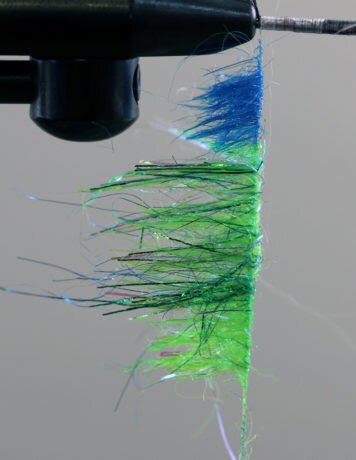
Step 6: Using some water, wet you fingers and sweep all your materials back. By wetting this material, it will compress everything, allowing for good tight wraps.
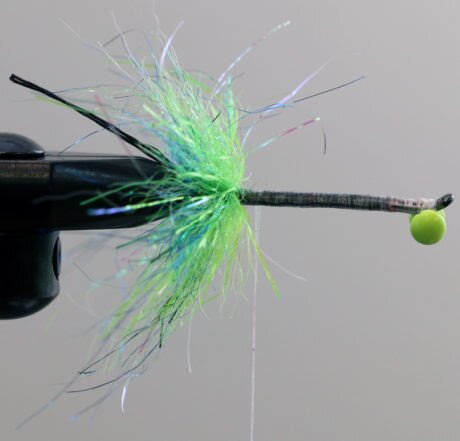
Step 7: Wrap your loop, you should get 3 turns. Brush out your material to dry.
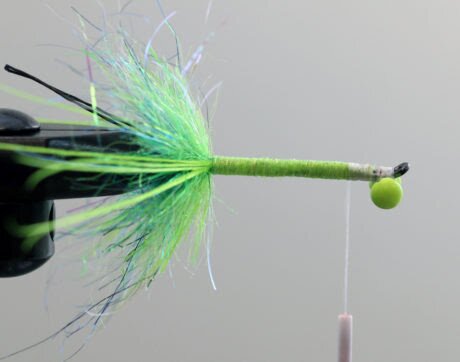
Step 8: Tie in 3-4 strands of your Chartreuse Rhea or Ostrich on each side of the shank. You want these feathers to extend back to the end of your stinger material. Now tie in your flat braid and wrap it to appx 2 hook eye widths back of your dumbbells.
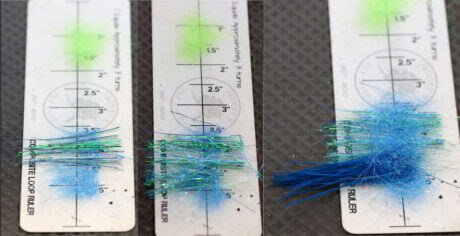
Step 9 Front Shoulder: Lay out ½” Chartreuse Ice. Blend a pinch of King Fisher Blue Ice Dub and Sky Fusion Dub, lay down appx 1.5” for your base. Take a few strands of Aqua Rainbow Polar Flash, Popsicle Aqua Veil and Clearwater Blue Angel hair, place these materials centered at the top of your chartreuse base layer. Take 15-20 strands of your ostrich and place on the bottom end of your base layer. You want the base end of these feathers to barely be past center, just enough to catch in the loop when you spin it. You want your ostrich to be appx double the length of the three flash materials at the top. Use another pinch of your blended Ice Dub and Fusion Dub to top off your shoulder.
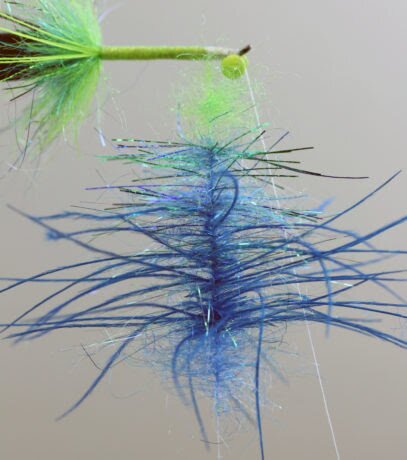
Step 10: Place your front shoulder in the loop. Spread material out to even it up and spin. Using your bodkin and brush, pick and comb out your material. Again, you want to create a thin rope core. Using wet fingers, like in step 6, sweep your material back.
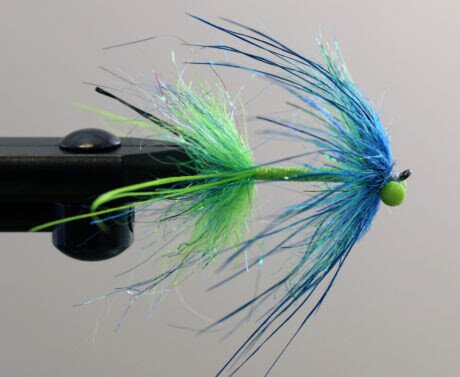
Step 11: Wrap your loop up to the eyes, making sure each wrap is nice and tight to each other. Whip finish and brush out material to dry. Loop on your hook and you are done.
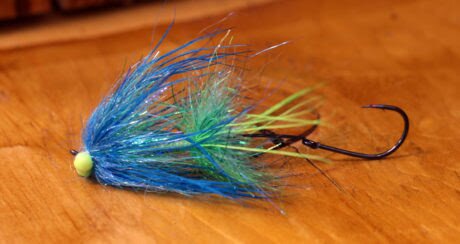
Finished Fly
Deb Paskall ties a killer Caddis Nymph that’s highly effective when you have Sedge (Caddis) actively moving and emerging in lakes. Vary the size and body color to match the Sedge/Caddis on your local lakes.
Materials list:
Hook: Size 12 Firehole 718 Curved
Thread: 12/0 Black Waxed
Rib: Fluoro Brite Fl Green
Body: Pheasant Tail
Thorax: Peacock Herl
Hackle: Grouse
Comments Off on Deb’S Green Haze Caddis Nymph
Filed under Soft Hackles
Brought to us by Flymen Fishing Co.
From Captain Chris Siess: Redfish are widely known for their propensity to eat a wide variety of lures and flies. Through years of guiding, I’m finding the more I fish for them, the more likely I am to use a natural-colored fly that looks “shrimpy.” Most of the time I’m fishing clear water or pressured fish and they wont always respond to a fly that looks like it’s dressed for a music festival. Recently, I developed a pattern that has proven to be successful, is natural looking, and can be fished in the mid to lower sections of the water column.
The Pheasant Drum Bugger is simple and extremely effective. A tail of marabou and few strands of crystal flash. A collar of ringneck pheasant, four legs to each side, Shrimp eyes, and then multiple more ringneck pheasant feathers make up the entire body. It is difficult to get more than three wraps of “hackle” out of a ringneck pheasant feather, but the variety of feathers on a ringneck skin and the gorgeous variation they provide more than makes up for it. I’ll use seven or eight feathers per fly, tied on a size two saltwater hook.
Comments Off on Pheasant Drum Bugger by Capt. Chris Siess
Filed under Saltwater